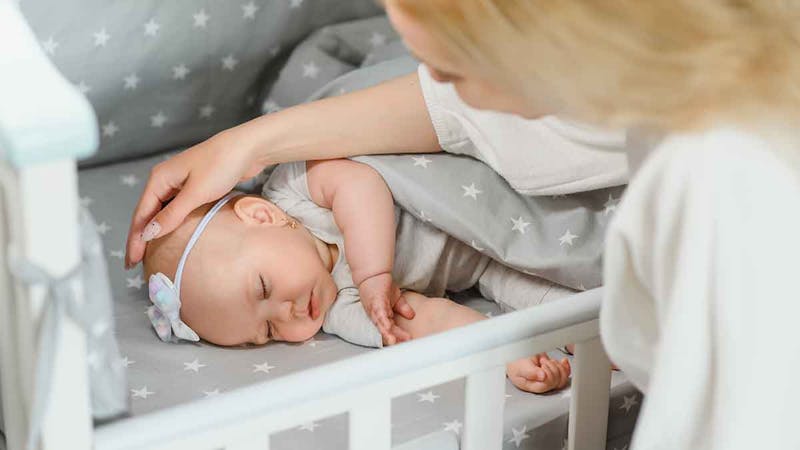
Two infant sleep products that together have been linked to more than 200 infant deaths have been banned from the U.S. marketplace under the Safe Sleep for Babies Act, signed into law by President Biden in May 2022.
The new law, which will go into effect in November 2022, prohibits the manufacture or sale of inclined sleepers that place babies at angles of greater than 10 degrees, and also bans padded crib bumpers. Both products pose an asphyxiation hazard to infants.
The law is a major victory for child safety advocates, including parents who have lost babies to dangerous sleep products and have dedicated themselves to working to prevent other families from suffering tragedies similar to their own. One of those parents is Feldman Shepherd client Lakin Harmon, whose 3-month-old son Cayson died in May 2017 in an inclined napper accessory that came with a Chicco Lullaby Dream Portable Playard. Harmon went public with her story in October 2019, hoping that speaking out would prompt a recall of this unsafe product which was then still on store shelves, and motivate legislators to act. To watch Harmon’s interview with 6 ABC Action News in Philadelphia (along with Feldman Shepherd attorney Daniel J. Mann) CLICK HERE. Feldman Shepherd also represents five families who lost children while sleeping in inclined Rock ‘n Play sleepers that were manufactured by Fisher-Price and were eventually recalled.
Child safety advocates also scored a victory on June 23, 2022, when a new federal safety standard approved by the Consumer Product Safety Commission (CPSC) went into effect requiring any product marketed or intended for infant sleep for babies up to 5-months-old to have a sleep surface angle of 10 degrees or lower and meet federal safety standards in place for cribs, bassinets and cradles, playards or bedside sleepers. Sleepers with designs similar to the Chicco Napper and the Fisher-Price Rock ‘n Play can no longer be sold in the United States.
Why Are Inclined Sleepers and Crib Bumpers Unsafe?
Inclined sleepers (often referred to as rockers, nappers or loungers) place babies at angles as great as 30 degrees, allowing infants to get into a chin-to-chest position in which their airway is blocked. These products also typically have soft padded surfaces which a baby’s face can sink into, which also increases the risk of asphyxiation.
The CPSC warned consumers in October 2019 to stop using infant inclined sleep products, citing reports of 73 infant deaths and 1,108 non-fatal incidents from January 2005 through June 2019. Astoundingly, in testimony before a Congressional committee that was investigating infant deaths in inclined sleepers, Fisher-Price executives admitted in June 2021 that the company had received 97 reports of infant deaths occurring in its Rock ‘n Play sleeper. Fisher-Price brought it to market in 2009 without research or testing as to whether it was safe. When the Rock ‘n Play was a hit, other baby product manufacturers entered the market with similarly designed products and a comparable absence of safety testing.
These trusted companies — including Fisher-Price, Kids II, Graco and Evenflo — have recalled more than 5 million inclined sleepers since April 2019. Some major retailers including Amazon, eBay, Walmart and buybuyBABY stopped selling inclined sleepers in late 2019 and early 2020 as safety concerns mounted.
Padded crib bumpers pose a suffocation risk when babies roll over and their nose and mouth are covered by the bumper. There also have been reported incidents where infants have died after their face becomes wedged between the bumper and the crib mattress or when a loose bumper pad wraps around their neck. The CPSC has identified 113 fatalities from January 1990 to March 2019 and 113 non-fatal incidents from January 2008 to March 2019 associated with crib bumpers. Some retailers, including Walmart and Target, had already stopped selling padded crib bumpers before President Biden signed the Safe Sleep for Babies Act into law.
Inclined sleepers and padded crib bumpers both disregard the safe sleep recommendations of the American Academy of Pediatrics (AAP). AAP recommends that infants be put to sleep on their backs, on a separate, flat and firm sleep surface without any bumpers, loose bedding or stuffed toys.
As the Safe Sleep for Babies Act is not retroactive, an untold number of inclined sleepers and crib bumpers already purchased by consumers remain in use in people’s homes and childcare centers notwithstanding the new law. Another concern is that these unsafe products may be handed down from child-to-child and family-to-family or sold on the second-hand market. And even with the Safe Sleep for Babies Act slated to go into effect in four months, some dangerous infant sleep products are still readily available for purchase. A search of the popular Etsy e-commerce website reveals numerous handmade crib bumpers for sale.
Are Other Infant Sleep Products Safe?
The unfortunate reality is that infant sleep products are created to maximize corporate profits. They are often designed by individuals without relevant expertise in risk factors for infant sleep, who fail to heed the safe sleep recommendations of the AAP.
The CPSC is aware of 254 incidents, including 21 fatalities, related to infant sleep products (inclined and flat) occurring between January 2019 and December 2020, according to a June 2021 press release. In addition to inclined sleepers and crib bumpers, other products tied to infant deaths include in-bed sleepers (meant for parents to co-sleep with their baby, which the AAP advises against), baby boxes (cardboard boxes with a fitted mattress), sleep hammocks, and travel and compact bassinets.
Mattresses used in playards and cribs also can pose a safety hazard. The CPSC is aware of at least 494 incidents, including 139 fatalities and 355 nonfatal incidents related to crib mattresses, which occurred between January 2010 and April 2021. The hazards associated with crib mattresses include suffocation from overly soft mattresses, head entrapment between the mattress and crib sides, and lacerations due to coils and springs breaking through mattresses. In January 2022, the CPSC approved a new federal standard to address these safety issues. To learn more about the new safety standard for infant mattresses CLICK HERE.
Again, the new standard is not retroactive, and does not address an untold number of unsafe infant mattresses that will remain in use in people’s homes and childcare centers, or that will be passed down among children and families, or re-sold second-hand.
What Should I Do If My Child Has Been Injured by an Inclined Sleeper or Crib Bumper?
Daniel J. Mann, a partner and product liability attorney at Feldman Shepherd, recommends contacting a product liability attorney as soon as possible if your child has been injured by an inclined sleeper, crib bumper or other infant sleep product.
Mann commented that even before the Safe Sleep for Babies Act was signed into law, product liability law has always required all products to be safe for their intended as well as expected use.
“Many consumers have no idea that these products have been recalled, and given the large numbers of inclined sleepers in use, there will undoubtedly be additional tragedies to unsuspecting families who were relying on infant product manufacturers to design safe products,” Mann said.
Mann, along with Feldman Shepherd co-founding partner Alan M. Feldman and Edward S. Goldis, have secured substantial recoveries on behalf of infants and young children who have been seriously injured or killed by children’s products, including baby slings, unstable furniture and magnetic toys.

